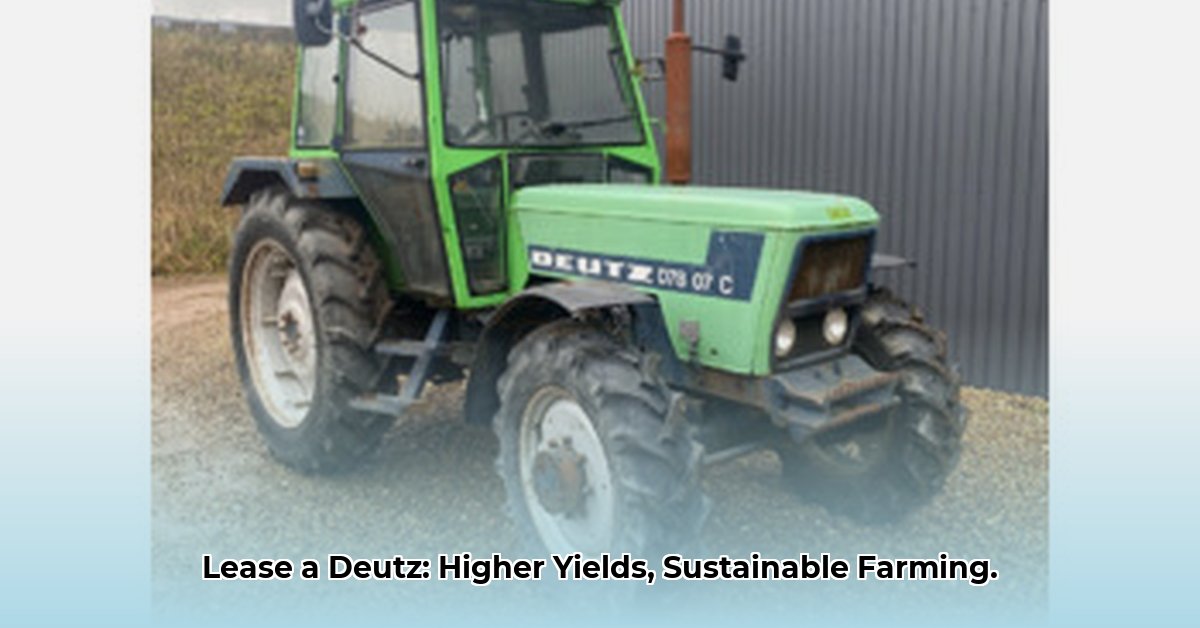
Thinking about leasing a Deutz tractor to boost your farm's sustainability and profitability? This guide provides a comprehensive, step-by-step approach to help you navigate the process. We'll cover everything from understanding Deutz tractors' role in sustainable agriculture to negotiating the best lease terms and ensuring optimal tractor maintenance. Learn more about using your tractor for efficient row creation with this helpful guide: tractor row creation.
Understanding Deutz Tractors and Sustainable Agriculture
Deutz tractors are known for their reliability and fuel efficiency, making them a popular choice for environmentally conscious farmers. Their powerful engines, yet lower fuel consumption, minimize environmental impact while providing the power needed for modern precision farming techniques. This translates to decreased operating costs and a reduced carbon footprint. Different Deutz models cater to various farm sizes and needs; thorough research to match your operation's requirements is crucial before leasing. Choosing the right model dramatically impacts efficiency and profitability.
Exploring Your Leasing Options: Operating vs. Capital Leases
Two primary leasing options exist: operating and capital leases. Operating leases are similar to renting; you pay regular installments but the leasing company retains ownership. This often involves lower upfront costs, making it more attractive to farmers with limited capital. However, you won't own the tractor at lease end.
Capital leases are closer to a loan; payments build toward eventual ownership. The upfront costs might be higher, but you build equity and possess the option to purchase the tractor at the end of the lease term. "A capital lease offers more long-term security for farmers invested in the sustainability of their operations," says Dr. Amelia Hernandez, Agricultural Economist at the University of California, Davis. The most suitable option hinges on your financial status, long-term goals, and risk tolerance.
Locating Your Deutz Dealer: Finding the Right Partner
Finding a reputable Deutz dealer is paramount. Begin with Deutz's online dealer locator, but also explore independent agricultural equipment dealers. Contact several dealers to compare pricing, lease terms, and customer service. Inquire about their Deutz experience, service departments, and overall reputation within the farming community. Don't underestimate the value of talking to other farmers; their firsthand experiences can be priceless.
Navigating the Lease Negotiation: Protecting Your Interests
Lease negotiation demands careful attention. Scrutinize the contract, including payment schedules, total lease cost, insurance responsibilities (who covers what?), maintenance obligations (are repairs included?), and the tractor's condition upon delivery. Always get everything in writing. If unclear on any terms, seek legal counsel or advice from an agricultural consultant before signing. This proactive approach protects your investment.
Preparing for the Lease: Gathering Necessary Documents
Before signing, gather all required paperwork. This usually includes proof of income (tax returns, bank statements), credit reports, details about your farming operation (size, crops/livestock), and possibly a business plan showcasing the tractor's intended use. Your dealer will provide a checklist; preparing these documents beforehand streamlines the entire leasing process and prevents delays.
Maintaining Your Deutz Tractor: Maximizing Lifespan and Minimizing Downtime
Routine maintenance is vital for maximizing your tractor's lifespan and minimizing downtime. Establish a preventative maintenance schedule; regular servicing, inspections, and prompt repairs are key. This approach not only prevents costly breakdowns but also significantly increases the return on your investment. Investing in preventative maintenance is an investment in your farm's productive longevity. "Regular maintenance isn't a cost; it's an investment in preserving your equipment's value and operational efficiency," advises Mark Olsen, Chief Mechanic at Olsen's Farm Equipment.
Lease Deutz Tractor: A Step-by-Step Checklist
- Research & Selection: Research Deutz tractor models to find the ideal fit for your farm. Compare features and specifications.
- Contact Dealers: Contact multiple Deutz dealers to obtain quotes and compare lease options.
- Lease Option Review: Analyze operating vs. capital leases, carefully weighing the pros and cons of each.
- Negotiate the Lease: Negotiate favorable lease terms, ensuring clarity on all clauses and responsibilities.
- Document Preparation: Compile all necessary financial and operational documentation.
- Contract Review: Thoroughly review the lease agreement with legal counsel if necessary.
- Tractor Delivery: Arrange for tractor delivery and conduct a thorough inspection upon arrival.
- Maintenance Plan: Create and strictly follow a comprehensive maintenance schedule.
Weighing the Pros and Cons of Leasing a Deutz Tractor
Leasing offers numerous advantages, but it's crucial to acknowledge both sides of the equation.
Pros: Lower upfront investment, access to advanced technology, predictable budgeting, reduced risk of obsolescence, easier financial management.
Cons: Recurring monthly payments, limited ownership and modification options, potential penalties for early termination, lease terms may restrict flexibility, ongoing maintenance costs (depending on the lease agreement).
Remember, leasing a Deutz tractor is a significant decision. Take your time, thoroughly research, and consult with experts to ensure alignment with your farm's short- and long-term goals. Making a well-informed decision will significantly benefit your farming operation.